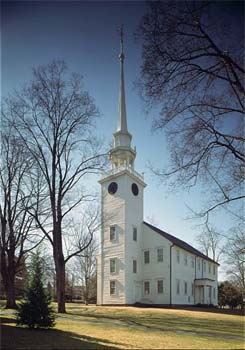The United Church of Christ (UCC) is a socially liberal mainline Protestant Christian denomination based in the United States, with historical and confessional roots in the Congregational, Restorationist, Continental Reformed, and Lutheran traditions, and with approximately 4,600 churches and 712,000 members. The UCC is a historical continuation of the General Council of Congregational Christian churches founded under the influence of New England Puritanism. Moreover, it also subsumed the third largest Calvinist group in the country, the German Reformed. Notably, its modern members' theological and socio-political stances are often very different from those of its predecessors.
The Evangelical and Reformed Church, General Council of the Congregational Christian Churches, and the Afro-Christian Convention, united on June 25, 1957, to form the UCC. The Evangelical and Reformed Church and the General Council of Congregational Christian Churches were themselves the result of earlier unions and had their roots in Congregational, Lutheran, Evangelical, and Reformed denominations. At the end of 2014, the UCC's 5,116 congregations claimed 979,239 members, primarily in the U.S. In 2015, Pew Research estimated that 0.4 percent, or 1 million adult adherents, of the U.S. population self-identified with the United Church of Christ.
The UCC maintains full communion with other Protestant denominations. Many of its congregations choose to practice open communion. The denomination emphasizes participation in worldwide interfaith and ecumenical efforts. The national leadership and General Synod of the UCC have historically favored culturally liberal views on social issues, such as civil rights, LGBT rights, women's rights, and abortion. UCC congregations are independent in matters of doctrine and ministry and may not necessarily support the national body's theological or moral stances. It self-describes as "an extremely pluralistic and diverse denomination".
